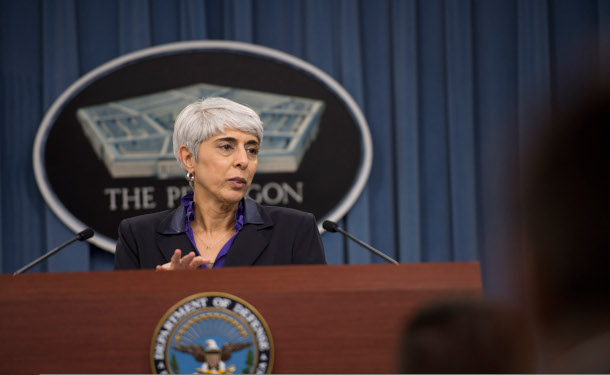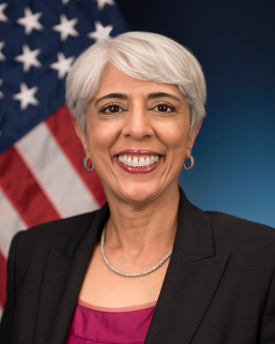New Science Advisor Arati Prabhakar
Air Date: Week of July 15, 2022

Arati Prabhakar previously served as the director of the Defense Advanced Research Projects Agency (DARPA). (Photo: Glenn Fawcett, U.S. Department of Defense, Public Domain)
President Biden has nominated, Arati Prabhakar to the cabinet level position of White House Science Advisor. If confirmed by the Senate, she would become the first woman, person of color and immigrant to hold the job. Seth Borenstein, a science writer at The Associated Press, joins Host Jenni Doering for details on the historic nomination.
Transcript
CURWOOD: It’s Living on Earth, I’m Steve Curwood.
President Biden recently nominated Arati Prabhakar as White House Science Advisor, which is now a cabinet level position. Arati Prabhakar earlier served head of DARPA, the Defense Advanced Research Agency. If confirmed by the Senate, Arati Prabhakar would become the first woman, person of color, and immigrant to become Presidential Science Advisor. Seth Borenstein is a science writer at The Associated Press and he spoke with Living on Earth’s Jenni Doering about this historic nomination.
DOERING: So who is Arati Prabhakar? And what has she done previously?
BORENSTEIN: She is a veteran government science agency leader. She has lead probably the quietest and least well known science agency in the government, NIST, National Institute of Standards and Technology. And she did it at age 34, which is just amazing. 34 years old and running a government science agency. And then she came back to the government during the Obama administration and ran DARPA, which also is not as well known as places like NASA or NOAA or EPA as science agencies, but is sort of the sexiest science agency out there. They're the James Bond government agency. The internet is a DARPA invention. During her time period there, she got the agency to start looking at RNA vaccines and the technology behind that. And that was, of course, in the 20 teens. And for most of us, that was a really good idea. Because that ended up helping lead to something called the COVID vaccine.
DOERING: Yeah, I'm very grateful for her work on that.
BORENSTEIN: So she hasn't been in the big name government agencies, but she has run some of the most important. And she has a personal story that's fascinating. She came from India as a young child. Moved to Texas. She became the first woman to get a physics PhD from CalTech. And the reason she went into engineering and science is because she was told that women don't do that, girls don't do that. So she decided to do that. She's gone from the young wunderkind at NIST to literally the, you know, white haired eminence now coming in.
DOERING: So what is the role of a Presidential Science Advisor, Seth? What do they actually do?
BORENSTEIN: It's a two part job, really. One is White House Science Advisor and the second part of it is Director of the Office of Science and Technology Policy. And so that position is now a Cabinet-level position under the Biden administration; it was never a Cabinet-level position before. What this really comes down to is how much can you influence the president and his advisors. So now you have something like four or five deputy directors in the Biden White House. You have a deputy director for climate, you have a deputy director for social science, you have a deputy director for energy, you have a deputy director for health, you have a deputy director for technology. And I think there's one for, sort of, national security-ish stuff, which is strange, because this job came out of the Cold War. And until the Obama administration, it was always sort of a nuclear, Cold War-ish position. You know, it was always a physicist, it was always a white male.

Dr. Prabhakar's official portrait as DARPA director. (Photo: Sun L. Vega, Wikimedia Commons, Public Domain)
DOERING: How significant is it, do you think, to finally have a Presidential Science Advisor nominee who is a woman, a person of color, and an immigrant? What kind of message does it send that Biden has picked Arati Prabhakar for this role after so many white men have held it?
BORENSTEIN: It shows sort of the inclusiveness that this administration made as a priority. When you talk to people about her, it's not that she's a woman, it's not that she's an immigrant, it's not that she's a person of color; it's that she's a person with an incredible amount of experience who gets things done. It's hard to imagine that there's someone who has had more experience in federal science than she has before getting this job. So, the people who do science policy just cannot praise her enough. I mean, and it isn't just the usual praise: it's real and more effusive praise. And even those who don't know her, but know of her, are just wowed by her.
DOERING: So one of the Biden administration's key priorities is climate change. So, I'm wondering how have previous Science Advisors to presidents advanced or influenced the administration's agenda on climate?
BORENSTEIN: Climate was not high up on the priorities until the Obama administration. The Obama White House Science Advisor John Holdren was a climate scientist. So, that was a first. And then, when Trump finally named a science advisor, he named a meteorologist, which was really surprising. And Kelvin Droegemeier, who has one of the best names for a meteorologist, Kelvin, which is one of the three ways you measure temperature: Kelvin, Celsius and Fahrenheit, gotta give him credit, that was the second straight climate, meteorology White House Science Adviser. Of course, the idea was keeping your head down. Doing the work but not having the White House pay attention because President Trump was an out and out climate change denier. I mean he'd talk about it and tweet about it.

A portrait of Arati Prabhakar taken before her nomination as the White House Science Advisor and the Director of the Office of Science and Technology Policy. (Photo: Christopher Michel, Flickr, CC BY 2.0)
DOERING: So how fair is it to say that she'll be joining a team within the White House that is already pretty focused on climate? And that she'll be helping to support that?
BORENSTEIN: Yeah, that's exactly what, she's, there is a crowded team of experts on, focused on climate change in this White House. And I think had the president named someone who was another climate change scientist to that position, that actually in some ways could dilute it because it's another person. So, her job isn't there to be the climate voice. You know, Biden has lots of climate voices.
DOERING: That's really heartening. And it seems vital. I mean, she won't be working only on climate issues, of course, but climate is one of the most important science issues that we face currently. And I guess I'm wondering, where do you think the president's agenda on science stands now? Especially, given how his climate legislation has gotten bogged down in Congress and now the U.S. Supreme Court has sent a really clear signal to agencies like the Environmental Protection Agency limiting their authority.
BORENSTEIN: So this administration is sort of the innovator. And then that comes back to: here's a woman who, this is her job. This is what she does. Now she does, it's not climate that she does. But whether it is like the James Bond DARPA, and wow, what can we do that's really cool and thinking out of the box. Or, it's something like in NIST, where, where can just a tiny little change, that's not really noticeable, but then when you turn around 10 years later you say, oh my, that made a big difference. So, she's coming from, with that experience. I'm not saying it'll work. But that's what they have to look for right now.
DOERING: I wish her the best of luck in this role. And we'll have to see, in terms of confirmation and what the Senate says here. Do we have a sense of the timing on that?
BORENSTEIN: Not yet. There's been an awful lot of other stuff going on in Congress.
DOERING: Really? I didn't know.
BORENSTEIN: You know, when she was first nominated to NIST 30 years ago, she flew through unanimously. Different time, it's hard to say that will, that'll happen again. And sometimes these positions get held up, a Senator can put an appointment like this on hold. But it's not like when there was this vast, long opening during the Trump administration. It was sort of adrift. The White House Science Office is not adrift right now.
CURWOOD: That’s Seth Borenstein, science writer for the Associated Press, speaking with Living on Earth’s Jenni Doering.
Links
Learn more about NIST – National Institute of Standards and Technology
Learn more about DARPA – Defense Advanced Research Projects Agency
Living on Earth wants to hear from you!
Living on Earth
62 Calef Highway, Suite 212
Lee, NH 03861
Telephone: 617-287-4121
E-mail: comments@loe.org
Newsletter [Click here]
Donate to Living on Earth!
Living on Earth is an independent media program and relies entirely on contributions from listeners and institutions supporting public service. Please donate now to preserve an independent environmental voice.
NewsletterLiving on Earth offers a weekly delivery of the show's rundown to your mailbox. Sign up for our newsletter today!
 Sailors For The Sea: Be the change you want to sea.
Sailors For The Sea: Be the change you want to sea.
 The Grantham Foundation for the Protection of the Environment: Committed to protecting and improving the health of the global environment.
The Grantham Foundation for the Protection of the Environment: Committed to protecting and improving the health of the global environment.
 Contribute to Living on Earth and receive, as our gift to you, an archival print of one of Mark Seth Lender's extraordinary wildlife photographs. Follow the link to see Mark's current collection of photographs.
Contribute to Living on Earth and receive, as our gift to you, an archival print of one of Mark Seth Lender's extraordinary wildlife photographs. Follow the link to see Mark's current collection of photographs.
 Buy a signed copy of Mark Seth Lender's book Smeagull the Seagull & support Living on Earth
Buy a signed copy of Mark Seth Lender's book Smeagull the Seagull & support Living on Earth

